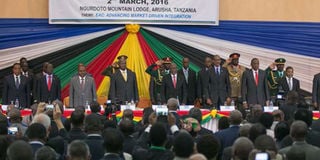EAC agency's appointees take office

President Uhuru Kenyatta joins other Heads of State from the East African Community for the 17th Ordinary EAC Summit in Arusha, Tanzania, on March 2016. The EAC has an agency that regulates trade. PHOTO | SAMUEL MIRING'U
What you need to know:
- The registrar of the East African Court of Justice Yufnalis Okubo welcomed the appointees as first commissioners to serve in the agency.
- He asked the partner states to borrow international best practices in the enforcement of the EAC Competition Act.
The five newly appointed commissioners who will steer the competition agency for the East Africa Community (EAC) have been sworn in at the regional headquarters in Arusha, Tanzania.
Mr Francis Kariuki (Kenya), Dr Frederick Ringo (Tanzania), Dr Didas Kayihura (Rwanda), Innocent Habarugira (Burundi) and Sam Watasa (Uganda) took oath as East African Community Competition Authority (EACCA) commissioners on Thursday.
This follows their approval by the Council of Ministers during their 33rd meeting held on February 29.
Each of the five partner states had fronted their names as nominees for the position in the EACCA, a body charged with regulating trade, created under the EAC Competition Act 2006.
Presiding over the function on behalf of the EAC Secretary-General Libérat Mfumukeko, the registrar of the East African Court of Justice Yufnalis Okubo welcomed the appointees as first commissioners to serve in the agency.
"The onset of the EAC Common Market, coupled with our engagement in the globalised world implies that a higher percentage of competition cases have a significant regional and international ramification.
"This called for the establishment of the EAC Competition Authority to regulate trade matters in the region,” the registrar said in a statement sent to newsrooms.
He asked the partner states to borrow international best practices in the enforcement of the EAC Competition Act that seeks to allow consumers take class action against goods or service providers to ensure quality.
It also seeks to seal loopholes that enable trade associations and firms operating across the region to engage in exclusive agreements, or form cartels, forcing consumers to pay higher prices for goods and services.
The Authority is an independent organ but subject to judicial review by the East African Court of Justice as provided for in Sections 44 and 46 of the EAC Competition Act 2006.
It is mandated to develop appropriate procedures for public sensitisation, consultation and participation.
Competition advocacy will entail providing information to citizens and businesses on competition whereas consultation will involve asking stakeholders for comments and advice regarding the authority’s enforcement practice and on matters it intends to regulate.
In relation to participation, the authority is expected to provide each government with comments and advice on how to streamline their regulations to suit the requirements of the Act.





